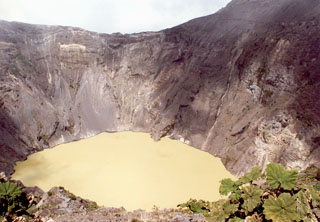Report on Irazu (Costa Rica) — March 2000
Bulletin of the Global Volcanism Network, vol. 25, no. 3 (March 2000)
Managing Editor: Richard Wunderman.
Irazu (Costa Rica) Microseisms during June-November 1999 take place 12-61 times a month
Please cite this report as:
Global Volcanism Program, 2000. Report on Irazu (Costa Rica) (Wunderman, R., ed.). Bulletin of the Global Volcanism Network, 25:3. Smithsonian Institution. https://doi.org/10.5479/si.GVP.BGVN200003-345060
Irazu
Costa Rica
9.979°N, 83.852°W; summit elev. 3436 m
All times are local (unless otherwise noted)
Seismic monitoring disclosed many days during June-November 1999 without any detectable microseisms. Monthly averages for July-November 1999 (table 6) tallied 12 to 61 microseisms a month, an average of roughly 0.5-2 microseisms per day. Other monitoring data were absent. The last eruption at Irazú consisted of a small phreatic explosion in December 1994 (BGVN 19:12).
Table 6. Monthly microseisms at Irazú as recorded at station IRZ2, located 5 km SW of the active crater, July-November 1999. The two months with available RSAM data show the range of computed values (e.g., October estimates of 7 to 101 units). Courtesy of OVSICORI-UNA.
| Month | Number of microseisms | RSAM |
| Jul 1999 | 61 | -- |
| Aug 1999 | 17 | -- |
| Sep 1999 | 35 | -- |
| Oct 1999 | 29 | 7-101 |
| Nov 1999 | 12 | 8-136 |
Geological Summary. The massive Irazú volcano in Costa Rica, immediately E of the capital city of San José, covers an area of 500 km2 and is vegetated to within a few hundred meters of its broad summit crater complex. At least 10 satellitic cones are located on its S flank. No lava effusion is known since the eruption of the Cervantes lava flows from S-flank vents about 14,000 years ago, and all known Holocene eruptions have been explosive. The focus of eruptions at the summit crater complex has migrated to the W towards the main crater, which contains a small lake. The first well-documented eruption occurred in 1723, and frequent explosive eruptions have occurred since. Ashfall from the last major eruption during 1963-65 caused significant disruption to San José and surrounding areas. Phreatic activity reported in 1994 may have been a landslide event from the fumarolic area on the NW summit (Fallas et al., 2018).
Information Contacts: E. Fernandez, E. Duarte, V. Barboza, R. Sáenz, E. Malavassi, R. Van der Laat, T. Marino, J. Barquero, and E. Hernández, Observatorio Vulcanologico y Sismologico de Costa Rica, Universidad Nacional (OVSICORI-UNA), Apartado 86-3000, Heredia, Costa Rica.

